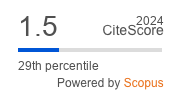Development and Usability Testing of TurbeLab Serious Game: A Game for Executive Functions Development
DOI:
https://doi.org/10.5753/jis.2023.3146Keywords:
executive functions, serious games, game designAbstract
Stimulating Executive Functions (EFs) is vital because they are part of the individual’s life. In this sense, this work aimed to create, develop and evaluate the usability of the TurbeLab serious game. Its creation was designed to assist in therapies for EFs development, more specifically working memory, cognitive flexibility and inhibitory control, focusing on the greater engagement of children in Elementary School. The TurbeLab project had the stages of analyzing the target audience’s needs, game design and usability pilot study, where the System Usability Scale (SUS) and a questionnaire assembled by the team were applied, recording high scores, saying that the chosen methodology must work on future tests. An evaluation stage by the judges, and EFs experts, was also performed, obtaining an excellent content index. A future applicability study will be conducted with children with Attention Deficit Hyperactivity Disorder (ADHD).
Downloads
References
Albert, B., & Tullis, T. (2023). Measuring the User Experience: Collecting, Analyzing, and Presenting UX Metrics. Elsevier Inc.: Third edition, pages 71:106.
Coluci, M. Z. O., & Alexandre, N. M. C. (2009) Adaptação cultural de instrumento que avalia atividades do trabalho e sua relação com sintomas osteomusculares. Acta paul. enferm, 22:149-154.
Alvarez, J. & Djaouti D. (2011). An introduction to Serious game Definitions and concepts. In, Proceedings of the Serious Games & Simulation for Risks Management Workshop, pages 11-15.
Bagdzius, A. C. (2022) TurbeLab: Jogo Sério Sobre Ciências para o Desenvolvimento de Funções Executivas. Master's dissertation presented to Universidade Presbiteriana Mackenzie, pages 102.
Ministério da Educação (2023). Base Nacional Comum Curricular (BNCC). Available in [link]. Accessed in 16 de jun. de 2023.
Bangor, A., Kortum, P. T. & Miller, J.T. (2008). An empirical evaluation of the system usability scale. International Journal of Human–Computer Interaction, 24:574-594.
Bul, K. C. M., Kato, P.M., Van der Oord, S., Danckaerts, M., Vreeke, L.J., Willems, A., van Oers, H.J.J., Heuvel, R.V.D., Birnie, D., Amelsvoort, T.A.M.J., Franken, I.H.A. & Maras, A. (2016) Behavioral Outcome Effects of Serious Gaming as an Adjunct to Treatment for Children with Attention-Deficit/Hyperactivity Disorder: A Randomized Controlled Trial. J Med Internet Res, 18:1-18.
Cerqueira, B. et al. (2020) Estimulação do Controle Inibitório em Crianças no Ambiente Escolar a partir de Jogos Digitais. Simpósio Brasileiro de Games e Entretenimento Digital (SBGames), pages 10.
Fonseca, V. D. (2014) Papel das funções cognitivas, conativas e executivas na aprendizagem: uma abordagem neuropsicopedagógica. Revista Psicopedagogia, 31:236-253.
Hounsell, M., Gasparini, I. & Krause, K. (2018) Aplicações dos jogos digitais nas funções executivas: um mapeamento sistemático da literatura. Simpósio Brasileiro de Games e Entretenimento Digital (SBGames), pages 8.
Krause, K. K. G.; Hounsell, M. D. S.; Gasparini, I. (2018) Aplicações dos jogos digitais nas funções executivas: um mapeamento sistemático da literatura. Simpósio Brasileiro de Games e Entretenimento Digital (SBGames), Foz do Iguaçu.
Lourenço, D. F., Carmona E. V. & Lopes M. H. B. M. (2022) Translation and cross-cultural adaptation of the System Usability Scale to Brazilian Portuguese. Aquichan, 22:1-15.
Marques, A. P. P.; Amaral & A. V. M.; Pantano, T. (2020). Treino De Funções Executivas e Aprendizado. 1ª. ed. [S.l.]: Manoele, pages 248.
Peñuelas-Calvo, I, Jiang-Lin, L.K., Girela-Serrano, B., Delgado-Gomez, D., Navarro-Jimenez, R., Baca-Garcia, E. & Porras-Segovia, A. (2020). Video games for the assessment and treatment of attention-deficit/hyperactivity disorder: a systematic review. Eur Child Adolesc Psychiatry, 31:5-20.
Poon, K. (2018). Hot and Cool Executive Functions in Adolescence: Development and Contributions to Important Developmental Outcomes. Frontiers in Psychology, 10:8-2311.
Procci, K., Chao, A., Bohnsack, J. & Olsen, T. (2012). Usability in Serious Games: A Model for Small Development Teams. Computer Technology and Application 3:315-329.
Tourinho, A., Bonfim, C. & Alves, L. (2016) Games, TDAH e Funções Executivas: Uma Revisão da Literatura. Simpósio Brasileiro de Games e Entretenimento Digital (SBGames), pages 10.
Zyda, M. (2005) From visual simulation to virtual reality to games. IEEE Computer, 38:25-32.
Downloads
Published
How to Cite
Issue
Section
License
Copyright (c) 2023 Alice Couto Bagdzius, Pedro Henrique Pomar Soares, João Pedro Cyrillo, Elthon Douglas Silva Bicudo, Silvana Maria Blascovi de Assis, Bruno Silva Rodrigues, Ana Grasielle Dionísio Corrêa

This work is licensed under a Creative Commons Attribution 4.0 International License.
JIS is free of charge for authors and readers, and all papers published by JIS follow the Creative Commons Attribution 4.0 International (CC BY 4.0) license.








